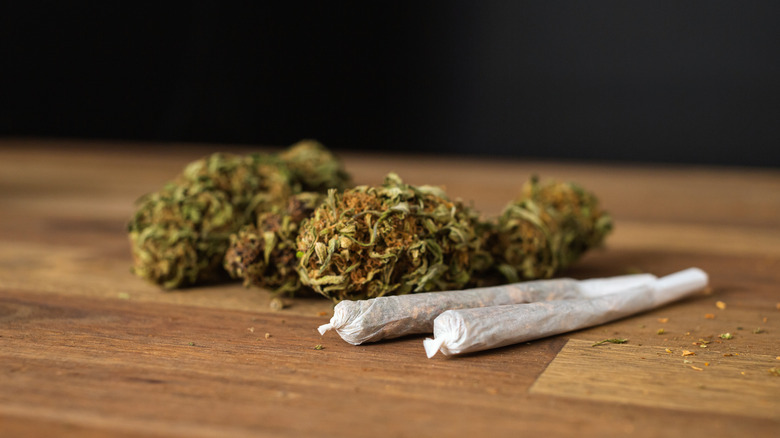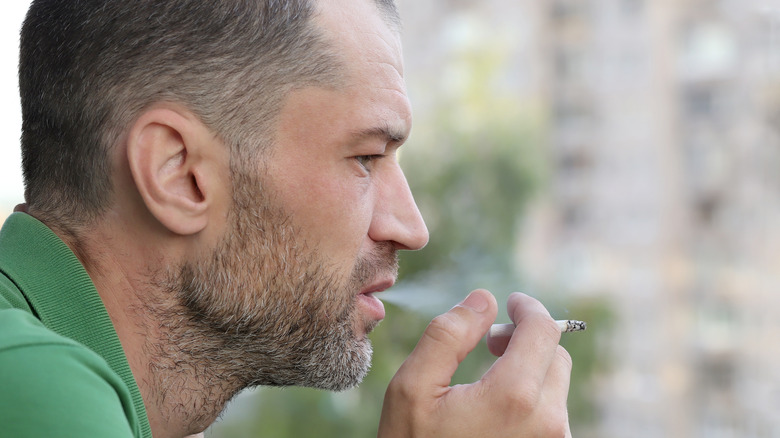What Happens To Your Body When You Quit Smoking Weed After Long Term Use, According To Science
With 24 states and D.C. legalizing the recreational use of marijuana and around a dozen more allowing medical marijuana to be prescribed, the drug is more widely available through legal channels in the U.S. than it has been since the early 20th century. In 2022, 22% of Americans 12 and older reported using marijuana in the U.S., per the U.S. Department of Health and Human Services, making it the most commonly used illicit drug in the nation. But not everyone who smokes or ingests marijuana products keeps doing it forever.
If you stop smoking marijuana after you have been using it for a long time, you can expect to feel some mild, uncomfortable withdrawal symptoms before you get to the positive physical effects of giving it up. However, cannabis withdrawal effects are not life-threatening or as temporarily debilitating as other substances have a reputation for being.
Some symptoms of marijuana withdrawal include restlessness, weight loss due to decreased appetite, headaches, and even mental health effects like irritability, depression, and anxiety. Insomnia and weird dreams may also come into play, per American Addiction Centers. But those symptoms are temporary, and you may eventually see positive effects from quitting the drug, including more motivation to focus on things that matter to your overall well-being, like your relationships, work and school life, and health, per Midwest Recovery Center. Your lungs may thank you too, especially if you tend to be a heavy smoker versus using edibles or any other non-smokeable means of ingesting marijuana.
Developing a dependency on marijuana is more common than you may think
What is classed as long-term marijuana use varies, but generally, using weed daily or close to this would fall into the long-term use category. Speaking to Integris Health, Jedidiah Perdue, M.D. stated, "Generally speaking, heavy use refers to daily or near-daily use of cannabis at an amount sufficient to lead to intoxication." Among those in this category, a report by Deborah S. Hasin, Ph.D., Tulshi D. Saha, Ph.D., and Bradley T. Kerridge, Ph.D. published by JAMA Psychiatry in 2015 found that three in 10 people developed a marijuana use disorder. People who fall under the chronic use category may experience unwanted side effects like anxiety, moodiness, and lack of motivation, but those symptoms will generally go away after a few weeks of abstaining. However, in extreme cases, there may be more permanent changes to the brain, per Integris Health.
Marijuana use disorder is when using marijuana becomes addictive to a person and they cannot stop, even if it is having a detrimental effect on their life. A key sign of this disorder is needing stronger marijuana to experience the "high" feeling experienced with weed in comparison to when a person first started using the drug. If you decide to stop using marijuana as a result of developing a marijuana use disorder, your body is highly likely to face some unpleasant symptoms as it gets used to being without the drug it has been dependent on.
Withdrawal symptoms vary in severity
While the majority of marijuana withdrawal symptoms are more unpleasant than dangerous, they can still be difficult to deal with — for example, severe cravings for weed or negative changes to your mental health. People with mental health diagnoses such as PTSD or personality, anxiety, or mood disorders may have a harder time with withdrawal symptoms, according to American Addiction Centers. Because of this, it's advisable to contact an addiction center or a substance use specialist to ensure the withdrawal process is as painless as possible. If you don't feel comfortable with this type of help, you should at least tell supportive family or friends about your decision so they can monitor your health and help you through the more unpleasant side effects.
Those who stop using marijuana after long-term use or as a result of marijuana use disorder can expect the withdrawal symptoms to kick in one to two days after last using the drug. The next stage occurs within two to six days, in which time the symptoms will grow in severity. However, the good news is that, in three weeks, the majority of symptoms will disappear — though this will vary from person to person. The even better news is that on the other side of the withdrawal symptoms, people who stop using weed may find they can focus better, their memories are improved, they have more energy and enjoy a more stable mood, and their cardiovascular and respiratory systems become healthier, per Midwest Recovery Centers.


